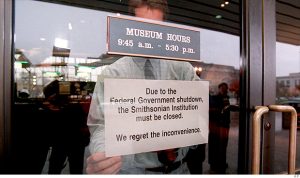I Am America (And So Can You)
By: Nathan Nye

Tuesday, October 1 marked the first government shutdown in 17 years, and no one is happy about it. I was sitting in my apartment watching C-SPAN with friends. Political crisis is one of the things I find most fascinating, so I was enthralled. One of my friends was less thrilled. He expressed his frustration that politicians express a fundamental unwillingness to compromise and are partisan fusspots.
“Let’s just get rid of them,” he said.
He’s not alone in that sentiment. Congressional approval is at 10%. This is in addition to having recently been named the least productive congress ever (or at least since we started measuring in 1942).
Editorials from the country’s prestige papers all call the move irresponsible.
Veterans moving barricades to storm their own memorials, Time Magazine setting up their own Panda Cam in protest of the National Zoo’s, and a slew of tweets about the #governmentshutdown all show a single message: no one is happy that the US government is shutdown. Members of Congress even have to pay double at some DC establishments.
In contrast, there has been an outpouring of affection for furloughed government employees, particularly in the District of Columbia. Free food, discounted drinks, and complimentary movie tickets are just a few things. The 6th and I St. Synagogue is hosting Shutdown Central, showing episodes of the West Wing and providing Wi-Fi, Ping-Pong (with Congressional leader’s faces taped to the paddles), and snacks.
There’s a big gap between our feelings on Congress and federal employees.
Why?
Because we’re deluded about our government and our role in it.
When my friend said let’s get rid of Congress, he was making a point that most frustrated citizens have made without recognizing the truth of the statement: we can get rid of every single member of Congress. It’s called an election and in a six year span you can replace every single elected official in government. This is a simplistic explanation that repeatedly gets touted on election eve, but there is a truth to it. There are all kinds of question about systems to answer and our role in them. For instance, why do we consistently vote out moderates, particularly in primaries? What about people who want to shutdown vital functions of government and vote for people who agree with them?
We’re deluded about politicians when in reality we should expect that our role as citizens is what props them up. It’s obviously a lot more complicated than “vote ‘em out,” but it’s certainly not as simple as “I have no role in this.”
Politics and ethics are inextricably bound, or rather, they should be. For both politicians and voters it’s integral to understand the responsibility they have to each other.
There are all kinds of complex relationships here (political ideology, cultural identity, reform and regulation, finance, and the list goes on), but I think it’s fair to say that the basic relationship between politician and citizen is still extant in modern politics. So what do we do about it? I don’t know, but I hope we can figure it out soon.
For an interesting take on this issue check out Duke Prof David Schanzer’s blog.
